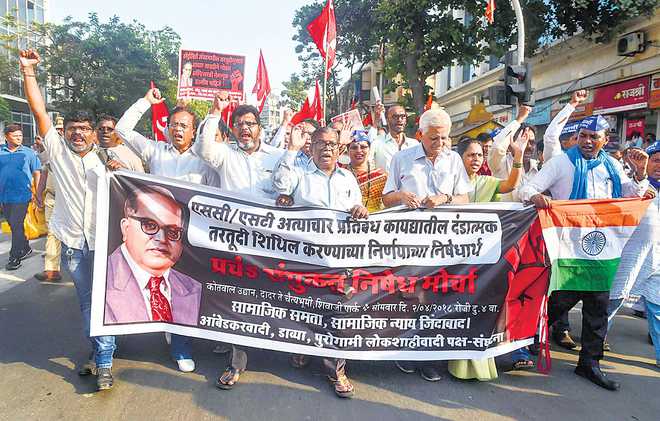Faizan Mustafa
VC, NALSAR University of Law
THE Supreme Court may have the word ‘supreme’ in its name but it is not supreme in our constitutional setup. Nor have we accepted the British concept of ‘supremacy of Parliament’. The Constitution alone is supreme and all authorities must honour the boundaries of their powers as defined by it. Thus innumerable judgments given by the apex court have been overturned by Parliament such as Shah Bano, Vodaphone, enemy property, Jallikattu and minority character of AMU. In fact, the first constitutional amendment was passed to undo the apex court’s judgment in Dorairajan (1950) where the court had quashed communal reservation in Madras. Several constitutional amendments were subsequently passed to overturn judgments on the question of ‘promotion’ in reservations.
On March 20, a two-judge Bench of the court issued guidelines that (i) no FIR be registered without a preliminary probe by the investigating officer, (ii) no one is to be arrested without the approval of appropriate authority and, (iii) an accused is eligible for anticipatory bail.
The Lok Sabha has now amended the SC/ST Act by inserting a new clause — Section 18 A — negating the Supreme Court’s judgment on both the registration of FIR as well as arrest. The statement of the SC&ST Bill clearly recalls the special nature of the 1989 Act and apex court’s judgment and then refers to the CrPC which mandates the registration of FIR without any preliminary inquiry and gives power to the investigating officer to arrest an accused if he has reason to suspect commission of crime by him.
But Parliament cannot simply undo the judgment. It has to do more. It has to remove the ‘very basis’ of the judgment. In Utkal Contractors (1987), the apex court agreed that rendering judicial judgment ineffective through legislative powers by removing the basis of judgment is a well-known pattern of all validating laws. In Prithvi Cotton Mills (1969), the Supreme Court again upheld the exercise of legislative power and admitted that it is not in dispute that legislature can pass a validating statute even with retrospective effect.
What was the basis of the Supreme Court’s judgment that Parliament did not remove in this Bill? On the basis of few isolated earlier High Court judgments, Justice Goel and Justice Lalit had concluded that ‘We have seen working of Prevention of Atrocities Act over the last three decades and its abuse has been judicially acknowledged’.
The Bill should have stated that court judgments are not a substitute to authentic empirical research. Similarly, the Statement of Objects and Reasons should have mentioned the real reasons overlooked by the court: poor investigation, absence of effective witness protection schemes and faulty prosecution.
The minister who introduced the Bill admitted in the Lok Sabha that the SC/ST Act had been abused only in 12 per cent of the cases. He should have said the decline in conviction rates has created a wrong impression about its abuse. In fact, NRCB data indicates that number of false cases has declined over time (2009-2015). In any case, comparing the conviction of hate crimes under the Act with ordinary crimes is absurd and irrational.
The Bill is also defective as it does not use ‘notwithstanding any judgment or order or direction of any court’ expression for the entire Bill but only for anticipatory bail. Since Justice Goel has said the protection of citizen’s liberty under Article 21 is the foremost duty of the court, the Bill should have said anticipatory bail is not a fundamental right; it is merely a statutory right introduced in the new CrPC 1973. In any case, it is an exception and not a rule; several states do not have it even for ordinary crimes.
The Bill should have said courts do not have legislative powers and must respect separation of powers. The Supreme Court can lay down guidelines only in cases of legislative gaps. For instance, it was right in laying down guidelines on sexual harassment, khap panchayats and mob lynching. But where the field is occupied by a parliamentary legislation, the judiciary is bound by the text of law though it can examine the constitutionality of such a law. The Bill should have responded to court’s anxiety about false cases. It should have said Indian Penal Code provides adequate protection against false complaints and malicious prosecution and since under the SC/ST Act, investigation is to be done by senior police officers, there is no need for diluting the Act.
Thus the Bill looks like a half-hearted response to Dalit concerns. It has failed in clearly removing the basis of Justice Goel’s judgment and thus can be struck down as the court may treat it as an act of ‘brazen overruling’. The government’s refusal in accepting the Opposition’s demand of saving it from judicial scrutiny by inserting it in IX schedule makes it further vulnerable. Loss of upper caste votes in 2019 could have been the reason of the government’s refusal.
Unlock Exclusive Insights with The Tribune Premium
Take your experience further with Premium access.
Thought-provoking Opinions, Expert Analysis, In-depth Insights and other Member Only Benefits
Already a Member? Sign In Now











